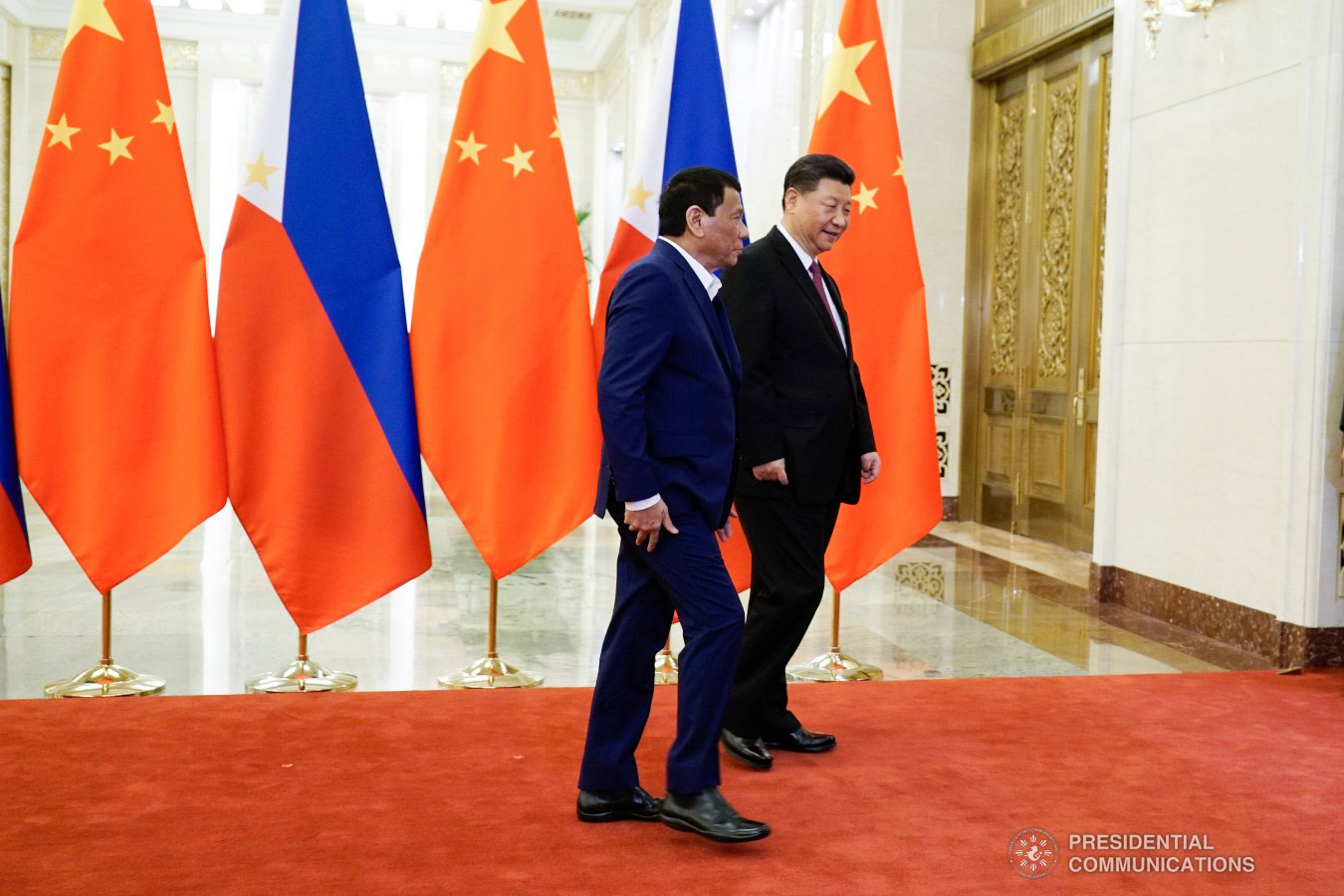Headline
Avoiding WPS conflict compels PH to adopt delicate balancing act

FILE: President Rodrigo Roa Duterte is accompanied by People’s Republic of China President Xi Jinping inside the Great Hall of the People in Beijing prior to their bilateral meeting on April 25, 2019. KING RODRIGUEZ/PRESIDENTIAL PHOTO
MANILA — The Philippine government is performing a “delicate balancing act” on the issue of the West Philippine Sea (WPS) so as to avoid engaging with conflict with other claimants such as China, President Rodrigo Duterte assured the public on Monday.
“On the matter of the West Philippine Sea. The avoidance of conflict — armed conflict and protection of our territorial waters and natural resources compel us to perform a delicate balancing act,” he said during his 4th State of the Nation Address at the Joint Session of the 18th Congress at the Batasang Pambansa in Quezon City.
“A shooting war is grief and misery multiplier. War leaves widows and orphans in its wake. I am not ready or inclined to accept the occurrence of more destruction, more widows and more orphans, should war, even on a limited scale, breaks out,” he said.
The chief executive added that the administration believes that a bilateral discussion would prove to be fruitful than a squabble in public, thus the existing Bilateral Consultation Mechanism on the South China Sea between the two states.
“That is why I will do in the peaceful way, mindful of the fact that it is our national pride and territorial integrity that are at stake,” he assured.
Answering those urging the government to stand up and stop those who fish in the country’s exclusive economic zone, Duterte said the Philippines “will do in due time”.
Defending PH ties with China
Meanwhile, the President defended Manila’s friendly ties with Beijing.
Duterte shared that during his first few months as president, the rifle sale between the Philippines and the United States was cancelled, a deal which was supposed to be critical on law enforcement, especially with the reported passing of weapons within Marawi at that time.
“When I became President and when the M16 rifles were cancelled by America upon the prodding of the US Congress, I found myself in a quandary because reports were already very ripe na (that) there was the passing of arms in Marawi,” he shared.
“And because the arms were already — mostly in the hands of the police, hands-me-down from the army were quite old and sometimes the bolt that pushes the bullet flies out and the barrel has really become lose, and there are no more lands and plains to push it into a circular trajectory to maintain its accuracy. So I was forced to go to China,” he said.
In 2016, he had his state visit to Beijing where he held a bilateral meeting with Chinese President Xi Jinping.
During his talks with Xi, the Filipino leader bared that he asserted Manila’s right to dig oil in the disputed waters.
“In that meeting, I said — Cabinet members were there — ‘I want to go to my territory to dig oil.’ That was the word, ‘I dig.’ Because that is ours. President Xi on the other hand said: ‘Well, you know there is a conflict there. Do you think, rather than go there and have a confrontation — not necessarily the grey ships, war ships. But you know a squabble there could lead to something else,'” Duterte said, recalling a conversation between him and the Chinese leader.
Duterte added that Xi brought Beijing and Manila’s recently thawed relations and asked that they discuss the prevailing territorial dispute “but not an outright precipitate move” because, as the Chinese president put it, “it can mean trouble.”
“If the trouble comes out from the mouth of a president of a republic, anong magawa ko? (What can I do). So what did I answer? ‘Well then maybe, sir, we can talk about this at some other time.’ But definitely, before I go, we must talk about the West Philippine Sea. We cannot you know, have our cake and eat it too,” he said.
Citing the existing condition in the area, Duterte said he cannot easily send the Coast Guards to drive the Chinese away from Philippine waters.
“China also claims the property and he is in possession. ‘That’s the problem. They’re the ones in possession and claiming all the resources there as an owner. We are claiming the same but we are not in the position because of that fiasco noong dalawang nag-standoff doon (when the two standoff there) during the time of my predecessor si Albert, ambassador,” he said.
Duterte was referring to the standoff between China and the Philippines at the Panatag (Scarborough Shoal) in 2012. On June 15, 2012, the Philippines withdrew its two vessels, but China did not.
“Tayo ang umatras. Pagsabi niya umatras, that was a kind of a compromise. Tayo ang umatras. Noong umatras tayo, pumasok sila.
Marami na (We were the ones who withdrew. When he said withdraw, that was a kind of a compromise. When we backed off, they entered the waters. They’re already too many),” he narrated.
Nevertheless, Duterte maintained that WPS belongs to the Philippines and the national honor and territorial integrity “shall be foremost in our mind”.
“When we may take the next steps in this smoldering controversy over the lines of arbitral ruling, the West Philippine Sea is ours. There is no ifs and buts. It is ours. But we have been acting, along that legal truth and line. But we have to temper it with the times and the realities that we face today,” Duterte said.





















